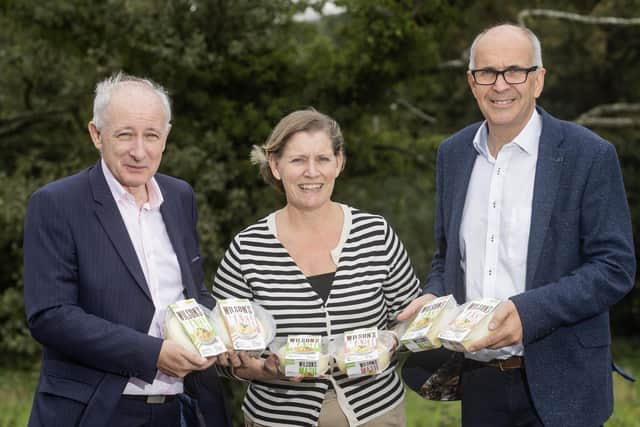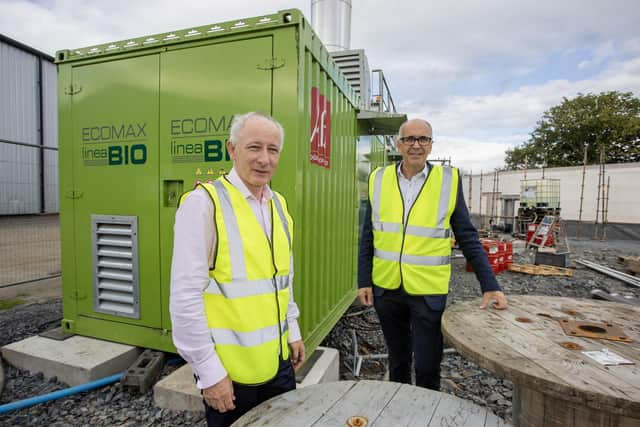£2M investment in new AD operation at Wilson’s Country
and live on Freeview channel 276
Located within the site of the existing business, the new plant will provide 60% of the company’s annual electricity requirements.
Wilson’s Country Managing Director, Lewis Cunningham, commented:
Advertisement
Advertisement
“The potato waste from the business will be used as the main feedstock for the AD operation. It has taken two years to get the project through near to completion.


“The last piece in the jigsaw puzzle was the establishment of an inter-connector between the AD plant and the national grid.”
He added:
“The new system is being gradually been brought on line over the next number of weeks.
“It will reach full operational capacity by the end of November.”


Advertisement
Advertisement
The management team at Wilson’s Country is confirming the key role of the new AD operation in helping to bring down the carbon footprint of the overall business.
Company CEO, Angus Wilson, takes up that story.
“We have been using certified ‘green electricity’ only within our entire operation for the past couple of years.
“This step, alone, has allowed us to reduce the carbon intensity of the company by 75%.
“Being able to generate a significant proportion of our green electricity on site allows us to reduce our overall energy bill while, also making more efficient use of the waste streams produced within the business.
Advertisement
Advertisement
“It all adds to the sustainability of Wilson’s Country into the future.”
AD is the conversion of organic feedstock by micro-organisms in the absence of oxygen into biogas and digestate.
The produced biogas can be used to generate electricity and heat.
Angus continued again:
“We have a large electricity requirement on site.
"This is needed to power our controlled temperature potato stores, processing and potato packing operations.
Advertisement
Advertisement
“Given the nature of our business, the actual amounts of electricity that we need can vary a lot throughout the year.
“However, there will also be occasions when there will be surplus electricity generated on site, which can be exported to the grid.
“A proportion of the waste heat produced will be used to maintain the operational temperature of the AD operation itself.
“We are also looking at options which will allow us make best use of the residual heat from the AD process that will be available to us.”
Wilson’s Country’s managing director continued:
Advertisement
Advertisement
“We are committed to securing a carbon net zero position for the business over the coming years.
“The investment in the new AD plant is a critically important step in this process.”
Challenging harvest conditions
Lewis Cunningham, is also confirming that local potato growers are facing into one of the most challenging harvests in living memory.
He added:
“The harvest is just the latest setback that has confronted potato growers this year.”
Advertisement
Advertisement
“The very wet weather in April meant that main crop potatoes were not planted out until the middle of May: a full six weeks later than would normally be the case.”
“Drought-like conditions followed, which hampered the germination and early growth of crops. But then came the heavy rains of July and August.
“Short of heavy snow in the middle of the summer, Northern Ireland’s potato growing community have had to cope with every extreme of weather that nature could ever conceive of throwing at them in 2023.”
Even before this year’s potato harvest got underway, potato growers knew that yields would be well down, year-on-year.
Advertisement
Advertisement
This is bad enough. However, tuber quality is also fast-becoming a problem.
Lewis Cunningham again:
“The switch from the very hot and dry conditions of June to the monsoons of July has created growth cracking problems in quite a number of crops.
“Something consumers do not want to see in bags and as a result, the potatoes in question cannot be sold in retail outlets.
“Also as the industry was coming out of a year with extremely low stocks of potatoes in store from the previous season, we really needed a early good yielding harvest with no problems.
Advertisement
Advertisement
“Early September saw harvest get underway but it quickly turned into a nightmare, as growers attempt to get potatoes out of the ground that is just saturated, conditions have been more like November than September,” confirmed Wilson Country’s managing director
“Ground conditions were pretty much bottomless at the time, especially after Storm Agnes.
“We saw potato harvesters getting totally bogged down in places like Bishopscourt in East Co Down. This would never happen in a normal year.”
According to Lewis Cunningham, potato growers across Europe have had major challenges to confront throughout 2023.
He explained:
“Most of these issues have been weather-related.
Advertisement
Advertisement
"Floods earlier in the year created major delays in planting dates in countries like France, Italy, Spain and Portugal.
“This was followed by a prolonged drought, which served to reduce the yield potential of potato crops dramatically.
“As a consequence, potato supplies will be very constrained right across Europe over the coming months.”
Adding to the economic pressures on potato growers in 2023 were the very strong fertiliser and agrochemical prices that characterised the entire growing season.
Lewis Cunningham further explained:
Advertisement
Advertisement
“Sustainable prices at retail level will be required to get the entire potato sector through the next few months.”
New mash offerings from Wilson’s Country
The beginning of October marked the launch of two new, pre-prepared potato mash products from Wilson’s Country: Wilson’s Mash and Wilson’s Naked Mash.
Both come in 400g packs: ready to heat in the microwave in just four minutes. They are available exclusively in TESCO Northern Ireland outlets.
The Naked Mash offering has absolutely nothing added – simply mashed potato: it is vegan compliant and suitable for a dairy free diet.
Advertisement
Advertisement
Wilson’s Mash, on the other hand, is a rich, tasty, mashed potato blended with cream, butter salt and pepper.
Both products are hand crafted in small batches to ensure that homemade taste and texture.
Wilson’s sales and marketing manager, Joanne Weir, commented:
“Both products reflect the growing demand for high quality potato products that also deliver on convenience.
Advertisement
Advertisement
“They have been specifically developed using carefully chosen potatoes to consistently deliver for local consumers in terms of their overall quality and taste.”
Joanne also confirmed that Wilson’s Country is now supplying pre-prepared mashed potato into Northern Ireland’s catering sector.
She continued:
“This is another example of adding value to locally grown potatoes. This is good news for consumers: it is also good news for our growers.”
Demand for potatoes is on the up at the present time.
This trend is being reflected in terms of both retail and catering-related sales.
Joanne Weir again:
Advertisement
Advertisement
“From a catering perspective people are going out again, after the hiatus created by the Covid pandemic.
“More generally, potatoes are being recognised for their healthy and nutritious properties as well as being good value for money.”
“This is a direct result of the significant research and development work undertaken by companies like Wilson’s Country to profile the health and nutrition-related benefits that are directly associated with the consumption of potatoes.”
Potatoes can be part of a healthy diet
Meanwhile, potatoes have received a key health boost on the back of a major research project recently completed by staff at the Pennington Biomedical Research Centre in the United States.
Advertisement
Advertisement
The study confirms that the potato is a healthy vegetable, filled with nutrients and packed with health benefits.
Moreover, potatoes do not cause weight gain or expose consumers to an increased risk of type 2 diabetes.
Dr. Candida Rebello, an assistant research professor at Pennington, takes up the story:
“We demonstrated that contrary to common belief, potatoes do not negatively impact blood glucose levels. In fact, the individuals who participated in our study lost weight.”
She added:
Advertisement
Advertisement
“People tend to eat the same weight of food regardless of calorie content in order to feel full.
“By eating foods with a heavier weight that are low in calories, you can easily reduce the number of calories you consume.
"The key aspect of our study is that we did not reduce the portion size of meals but lowered their caloric content by including potatoes.
“Each participant’s meal was tailored to their personalized caloric needs, yet by replacing some meat content with potato, participants found themselves fuller, quicker, and often did not even finish their meal.
"In effect, you can lose weight with little effort.”
Advertisement
Advertisement
The study involved 36 participants between the ages of 18 and 60 who were overweight, had obesity, or insulin resistance.
Participants in the trial were fed precisely-controlled diets of widely available common foods including either beans, peas, and meat or fish, or white potatoes with meat or fish.
Both diets were high in fruit and vegetable content and substituted an estimated 40% of typical meat consumption with either beans and peas or potatoes.
“We prepared the potatoes in a way that would maximize their fiber content. When we compared a diet with potatoes to a diet with beans and peas, we found them to be equal in terms of health benefits,” Rebello further explained.
Advertisement
Advertisement
Lewis Cunningham believes the Pennington study re-writes the rule book in terms of potatoes’ perception as part of a healthy diet.
He said:
“For the last number of years potatoes have been associated with carbs. And when people want to lose weight, they are told to review what they eat and especially look at the carbs that they eat.
“Potatoes, according to Eatwell Guide are not a vegetable but a carb. Hence many consumers cut out, or significantly reduce, the amount of potatoes they regularly include within meals”
Cunningham added:
“The significance of the Pennington research is that it fundamentally confirms the benefits of potatoes within a healthy diet.”
Advertisement
Advertisement
The Wilson’s Country representative takes issue with the down-playing of potatoes within the Eatwell nutritional principles espoused by the National Health Service and taught in schools throughout Northern Ireland and the rest of the UK.
“From a young age it’s taught vegetables and healthy and good, potatoes are not a vegetable but a carb and not so good.”
He concluded:
“We need to have the role of potatoes within a healthy diet fundamentally reviewed by health and education professionals.
“And this must work must be carried out as matter of priority.”
Advertisement
Advertisement
About: Wilson’s Country is the leading potato brand in Ireland. Their commitment to innovation and marketing has positioned us as one of the leaders in the industry, supplying retailers, foodservice and food manufacturers with own label and branded prepack, peeled and convenience potatoes.
Since Angus Wilson started the business from the family farm in the 1980’s we have grown from strength to strength.
They now employ over 70 staff who work from our 6 acre site in County Armagh. They are one of the premier potato packers and processors in Ireland.